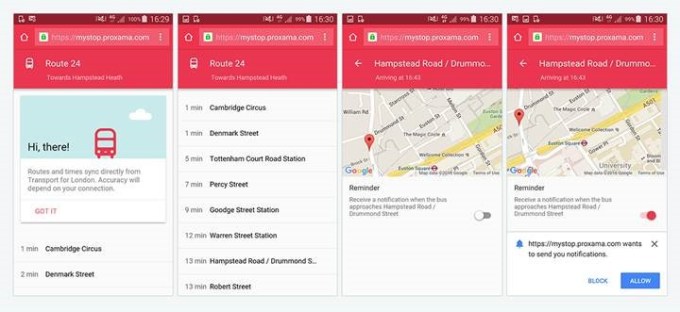Google has been working for a while now on ways to bring more Bluetooth beacon projects into its ecosystem, including the launch of its Eddystone open beacon format and its concept of the “app-free” Physical Web. Today a vendor in the UK unveiled a new project that shows how transportation might fit into the picture.
Proxama, which operates a network of Bluetooth beacons in the UK, says has launched a new service called MyStop: transport alerts that come up automatically on your Android handset or iPhone if you have Chrome installed and Bluetooth turned on. Chrome is the first of these. Proxama claims that other browsers that will eventually support Physical Web notifications from Eddystone beacons include FireFox, Opera and Microsoft’s new Edge browsers — a collective move, it seems, to rival Apple and its own iBeacons strategy.
There are various ways today that you can use smartphones to get transportation information — for example transportation native apps, or SMS-based alert services, or web pages that you refresh. But the idea here, as with Google’s Physical Web project in general, is that you don’t need any of these.
The alerts just come to you, and you can modify them to fit your specific journey. It’s an interesting concept for how the future of mobile services might look, especially to a market of consumers who are later adopters and therefore less proactive mobile users, or are simply bored of having too many apps.
“Google is a partner for the service and has provided technical support to Proxama throughout the development of the MyStop progressive web app in the lead up to today’s latest release of Chrome,” Proxama’s CEO of proximity marketing, Jon Worley, told TechCrunch. (You can find Chrome’s release updates here.) Proxama says it has upgraded its own TapPoint marketing platform to work with Google’s Physical Web specs, and it looks like the extent of Google’s role has been around technical guidance for building a Progressive Web App and deploying the Physical Web.
Initially, the notifications will be focused around London buses, starting with 100 vehicles, but Worley says that the plan is to expand that across the UK, to other transportation mediums, and to other places where Proxama’s beacons are situated. These include “high footfall” locations like shopping malls, stadiums, city centers and big events, he said.
Worley said the service works like this: When a user travels on an enabled bus with a beacon present and that user’s phone’s Bluetooth is on, the Chrome browser will deliver a notification alerting them to the service.
By clicking the notification, the user then is directed to a webpage that updates him/her on the progress of a journey, with real-time updates on delays or alterations to the route according to the user’s exact location. Users can set reminder notifications, for example to get a ping when they are approaching their destination.

The data for MyStop is coming from open APIs from Transport for London, the city agency that runs the public transport service. These are free to use.
“It makes them available for free on the understanding the market will innovate and deliver valuable experiences for their customers,” he said.
If there are financial terms of this service, in fact, they are not really very transparent at the moment — Worley says these cannot be disclosed “as Proxama is a listed company” (whose shares, I should point out, have jumped almost 20% on this news today).
There are indications that advertising, or providing a network to enable it, will play a significant part. Another company involved in MyStop is Exterion, which says it is Europe’s largest independent out-of-home advertising business, and whose inventory includes 8,500 London buses. Exterion says it has upgraded its bus beacon network to support Eddystone and will be taking the proposition to brands as a new ad opportunity.
“It’s clear that Eddystone and the Physical Web creates exciting engagement opportunities for brands to better engage with consumers on the move,” said Mike Wood, Product Strategy and Innovation Director, Exterion Media, in a statement. “We have enhanced our bus beacon network to support Eddystone and we’re excited to see how brands take advantage of this.” Other beacon projects Exterion has worked on recently include a campaign with Fox and Shazam for Kung Fu Panda 3.
“With 47% of all handsets shipping with Chrome, this approach enhances the scale of campaigns significantly, and with it the potential to increase the ROI on mobile advertising campaigns,” Proxama notes.
It doesn’t look like Google is involved here beyond education and technical guidance related to Bluetooth networking and implementing an app for the Physical Web. But as the search giant continues to look for new “screens” and platforms to build its own digital advertising empire, you can see why it may have an interest in playing a part in future beacon networks.
